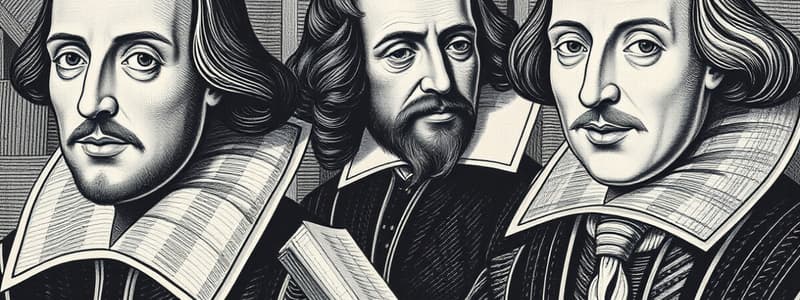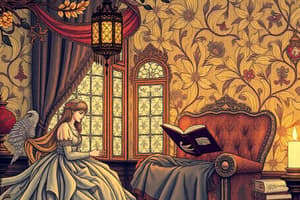Podcast
Questions and Answers
Which of the following writers is known as the Father of English Drama?
Which of the following writers is known as the Father of English Drama?
- Nathaniel Hawthorne
- William Shakespeare (correct)
- Geoffrey Chaucer
- Edgar Allan Poe
What literary work is Harriet Beecher Stowe most famous for?
What literary work is Harriet Beecher Stowe most famous for?
- Tom Sawyer
- The Raven
- The Scarlet Letter
- Uncle Tom’s Cabin (correct)
Which author is recognized as the Father of Epic Poetry?
Which author is recognized as the Father of Epic Poetry?
- Dante Alighieri
- Homer (correct)
- Leo Tolstoy
- Guy de Maupassant
Which of the following titles is associated with Edgar Allan Poe?
Which of the following titles is associated with Edgar Allan Poe?
Who is known as the Father of English Literature?
Who is known as the Father of English Literature?
Which literary figure is associated with the work 'War and Peace'?
Which literary figure is associated with the work 'War and Peace'?
Which author is popularly recognized as the Indian Shakespeare?
Which author is popularly recognized as the Indian Shakespeare?
Which work is associated with the author Rabindranath Tagore?
Which work is associated with the author Rabindranath Tagore?
Which author is known as the 'Poet of Beauty'?
Which author is known as the 'Poet of Beauty'?
Who is referred to as the 'Father of English Novel'?
Who is referred to as the 'Father of English Novel'?
Which author is known for the term 'Egotistical Sublime'?
Which author is known for the term 'Egotistical Sublime'?
Who is described as 'The Father of Tragedy'?
Who is described as 'The Father of Tragedy'?
Which of the following authors is known as the 'Great Master of Verse'?
Which of the following authors is known as the 'Great Master of Verse'?
Which writer is known as 'The Bard of Ayrshire'?
Which writer is known as 'The Bard of Ayrshire'?
Who has been referred to as 'The Morning Star of the Reformation'?
Who has been referred to as 'The Morning Star of the Reformation'?
Which author is recognized for being 'The Father of English Grammar'?
Which author is recognized for being 'The Father of English Grammar'?
Which poet is often referred to as 'The Poet of Supernaturalism'?
Which poet is often referred to as 'The Poet of Supernaturalism'?
Who is labeled as 'The Father of Indian English Poetry'?
Who is labeled as 'The Father of Indian English Poetry'?
Flashcards
Shakespeare's greatest work
Shakespeare's greatest work
Shakespeare's plays, particularly Macbeth and Hamlet, represent his significant contribution to English drama
Uncle Tom's Cabin's impact
Uncle Tom's Cabin's impact
A powerful anti-slavery novel that substantially influenced public opinion and the abolitionist movement, by Harriet Beecher Stowe.
Father of Horror
Father of Horror
Edgar Allan Poe, known for shaping modern horror and mystery genres through his works.
Chaucer's major work
Chaucer's major work
Signup and view all the flashcards
Father of English Literature
Father of English Literature
Signup and view all the flashcards
Maupassant's contributions
Maupassant's contributions
Signup and view all the flashcards
Homer's epic poems
Homer's epic poems
Signup and view all the flashcards
Tagore's Nobel Prize
Tagore's Nobel Prize
Signup and view all the flashcards
Indian Shakespeare
Indian Shakespeare
Signup and view all the flashcards
Hawthorne's exploration
Hawthorne's exploration
Signup and view all the flashcards
Harry Potter's impact
Harry Potter's impact
Signup and view all the flashcards
Milton's epic poem
Milton's epic poem
Signup and view all the flashcards
The Little Prince's theme
The Little Prince's theme
Signup and view all the flashcards
Confucius's Golden Rule
Confucius's Golden Rule
Signup and view all the flashcards
C.S. Lewis's creation
C.S. Lewis's creation
Signup and view all the flashcards
Tolstoy's focus
Tolstoy's focus
Signup and view all the flashcards
Study Notes
Authors and Their Contributions
- William Shakespeare: Considered the greatest English writer, known as the Bard of Avon. Renowned for his sonnets, plays like Macbeth and Hamlet, and contributions to English drama and poetry.
- Harriet Beecher Stowe: Wrote Uncle Tom's Cabin, a pivotal anti-slavery novel that significantly influenced public opinion and the abolitionist movement.
- Edgar Allan Poe: Regarded as the Father of Horror and English Mystery, famous for poems like The Raven and short stories that shaped modern detective fiction.
- Geoffrey Chaucer: Known as the Father of English Literature, recognized for The Canterbury Tales, which offer a rich glimpse into medieval life and character studies.
- Guy de Maupassant: Celebrated as the foremost French short story writer, his storytelling techniques and themes paved the way for modern narrative forms.
- Homer: Mythical Greek figure credited as the Father of Epic Poetry, known for the Iliad and Odyssey, foundational works in Western literature.
- Rabindranath Tagore: Indian National Poet awarded the Nobel Prize in Literature for his work Gitanjali, promoting cultural and educational reform.
- Kalidasa: Revered as the Indian Shakespeare, his plays and poems are foundational to classical Indian literature.
- Nathaniel Hawthorne: Best known for The Scarlet Letter, a profound exploration of morality, sin, and redemption in Puritan America.
- J.K. Rowling: Gained global popularity for the Harry Potter series, transforming children's literature and sparking a massive cultural phenomenon.
- John Milton: Renowned for Paradise Lost, an epic poem examining themes of free will, temptation, and redemption.
- Antoine de Saint-Exupéry: Author of The Little Prince, a philosophical tale reflecting on human nature and relationships.
- Confucius: Ancient philosopher known for the Golden Rule, emphasizing ethics, morality, and social harmony.
- C.S. Lewis: Created the acclaimed Chronicles of Narnia, blending mythology with moral storytelling.
- Leo Tolstoy: Major Russian novelist wrote War and Peace and Anna Karenina, exploring complex themes of love, war, and society.
- Omar Khayyam: Persian poet celebrated for the Rubaiyat, notable for its philosophical insights and contemplation on life.
- Dante Alighieri: Author of Divine Comedy, a monumental work that explores the journey through Hell, Purgatory, and Paradise.
- Boris Pasternak: Best known for Doctor Zhivago, a novel that critics acclaimed for its depiction of the Russian Revolution.
- Jane Austen: Famous for Pride and Prejudice and Sense and Sensibility, her novels critique the British landed gentry of the 19th century.
- Charles Dickens: Known for Great Expectations and numerous works that depict social inequalities and transform Victorian society.
- Mark Twain: Recognized for The Adventures of Huckleberry Finn, an important American novel addressing themes of race and identity.
- Virginia Woolf: Pioneer of modernist literature, known for To the Lighthouse and her exploration of consciousness and feminist themes.
- Fyodor Dostoevsky: Major figure in literature with Crime and Punishment, acknowledged for deep psychological insights and existential philosophy.
- Haruki Murakami: Contemporary author noted for Norwegian Wood, blending surrealism and poignant emotional narratives.
- Gabriel García Márquez: A key figure in magical realism, best known for One Hundred Years of Solitude, exploring themes of solitude and the human experience.
- Chinua Achebe: Author of Things Fall Apart, a landmark novel addressing the clash of cultures in colonial Africa.
- Margaret Atwood: Renowned for The Handmaid's Tale, a speculative fiction that examines themes of power, gender, and society.
- Bhavik Sarkhedi: Modern author known for The Unproposed Guy, delving into contemporary themes of love and relationships.
- Venerable Bede: Early English historian credited as the Father of English Learning and History through his writings.
- King Alfred the Great: Known for his contributions to prose and education, recognized as the Father of English Prose.
- Aeschylus: The Father of Tragedy, laid the foundations for dramatic storytelling in theatre.
- Nicholas Udall: The first English comedy writer, contributing significantly to the early development of English drama.
- Edmund Spenser: Recognized as "The Poet's Poet" for his influential works, bridging the Renaissance and Reformation periods.
- Gutenberg: Credited as the Father of Printing, revolutionizing the dissemination of knowledge.
- William Caxton: The first printer in England, established the English press and contributed to the standardization of English.
- Francis Bacon: Renowned for his work in philosophy and science, also associated with the development of the English essay.
- John Wycliffe: Semantic historical figure known for translating the Bible into vernacular English, earning the title "The Morning Star of the Reformation."
- Christopher Marlowe: A significant playwright considered the Father of English Tragedy, contributing to themes of identity and power.
- Robert Burns: The National Poet of Scotland, celebrated for his lyrical poetry and folk themes.
- William Dunbar: A notable Scottish poet often referred to as "The Chaucer of Scotland" for his works in the late 15th century.
- John Dryden: Recognized as the Father of English Criticism for his influential writings on literature and drama.
- William of Newbury: Credited as the Father of Historical Criticism through his historical writings and analysis.
- John Donne: Noted for metaphysical poetry and themes of love, he is often referred to as the Poet of Love.
- Alexander Pope: Known for his satirical verse and the development of mock-heroic poetry.
- William Wordsworth: A key figure in Romantic literature, praised as the Poet of Nature and known for his focus on childhood and nature themes.
- Samuel Taylor Coleridge: A pivotal Romantic poet known for his supernatural themes and as part of the Lake Poets group alongside Wordsworth.
- Lord Byron: The Rebel Poet, recognized for his charismatic, defiant approach in poetry and personal life.
- Percy Bysshe Shelley: Celebrated for his revolutionary and hopeful themes, often focusing on regeneration.
- John Keats: Renowned for his emphasis on beauty and emotional depth in poetry.
- William Blake: Recognized as the Mystic Poet for his spiritual and visionary approach to art and poetry.
- Lord Alfred Tennyson: The Representative of the Victorian Era, his works reflect the values and challenges of his time.
- George Bernard Shaw: Lauded as a modern dramatist and iconoclast for his critical and insightful perspectives on social issues.
- Lindley Murray: Known as the Father of English Grammar for his influential work in linguistics and education.
- James Joyce: Recognized for his innovative narrative techniques, including stream of consciousness in novels like Ulysses.
- Henry Fielding: The Father of the English Novel, known for his novel Tom Jones, which helped define the form of the modern novel.
- Samuel Johnson: Father of the English One Act Play, significant in the history of English literature and criticism.
- Sigmund Freud: Renowned psychoanalyst whose theories have influenced literature, psychology, and the humanities.
- Robert Frost: An influential American poet known for exploring complex themes of nature and human emotion.
- Francesco Petrarch: The Father of the Sonnet, credited with establishing the form in European poetry.
- Sir Thomas Wyatt: Often referred to as the Father of the English Sonnet, instrumental in introducing the form to English poetry.
- Henry Louis Vivian Derozio: Recognized as the Father of Indian-Anglican Sonnet, contributing to a unique fusion of cultures in poetry.
- William Hazlitt: Regarded as the Critic’s Critic for his impactful essays and critiques in literature.
- Charles Lamb: Known for The Essays of Elia, offering personal reflections and insights on life and society.
- Arthur Miller: Acclaimed playwright, compared to Mulk Raj Anand for his engagement with social themes.
- Joseph Addison: Seen as the voice of humanist Puritanism, contributing essays that shaped Enlightenment thinking.
- Ralph Waldo Emerson: An influential essayist and philosopher, often lauded as the American counterpart to Seneca.
- Mother Teresa: Revered humanitarian known for her selfless service, often viewed as a modern saint.
- Thomas Nash: An early Indian English writer noted for his contributions to juvenile literature.
- Thomas Dekker: A forerunner of humor in English literature, known for his plays and narratives.
- Henrik Ibsen: The Father of Modern Theatre, his works advanced realism and psychological drama.
- Nissim Ezekiel: A major figure in Indian English poetry, promoting contemporary themes and modernist techniques.
Studying That Suits You
Use AI to generate personalized quizzes and flashcards to suit your learning preferences.




